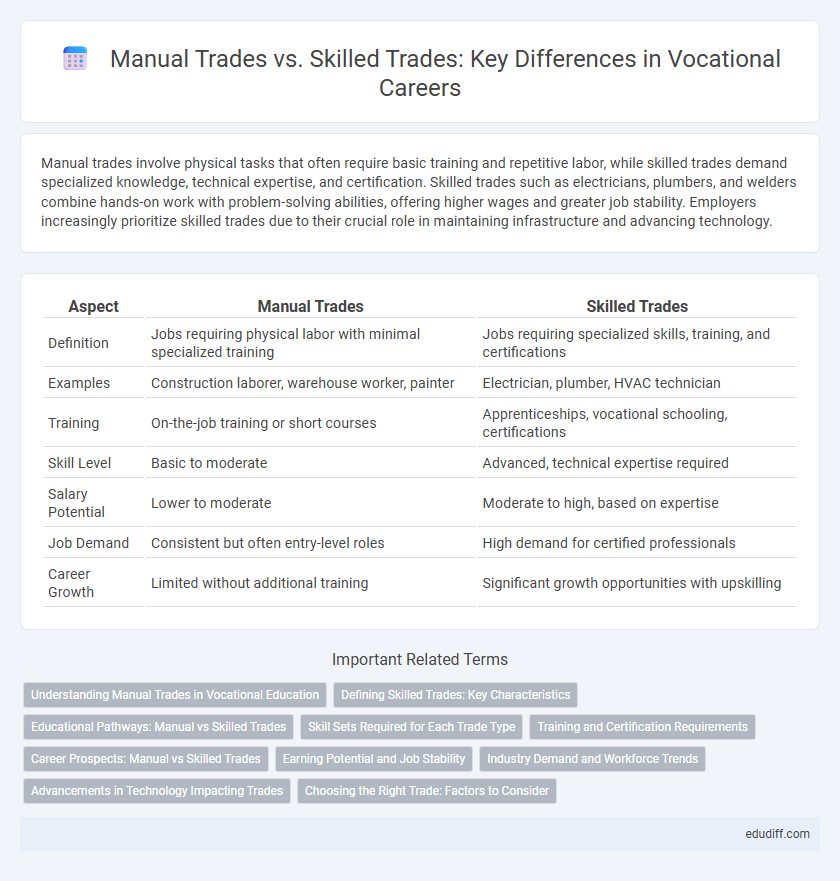Manual trades involve physical tasks that often require basic training and repetitive labor, while skilled trades demand specialized knowledge, technical expertise, and certification. Skilled trades such as electricians, plumbers, and welders combine hands-on work with problem-solving abilities, offering higher wages and greater job stability. Employers increasingly prioritize skilled trades due to their crucial role in maintaining infrastructure and advancing technology.
Table of Comparison
| Aspect | Manual Trades | Skilled Trades |
|---|---|---|
| Definition | Jobs requiring physical labor with minimal specialized training | Jobs requiring specialized skills, training, and certifications |
| Examples | Construction laborer, warehouse worker, painter | Electrician, plumber, HVAC technician |
| Training | On-the-job training or short courses | Apprenticeships, vocational schooling, certifications |
| Skill Level | Basic to moderate | Advanced, technical expertise required |
| Salary Potential | Lower to moderate | Moderate to high, based on expertise |
| Job Demand | Consistent but often entry-level roles | High demand for certified professionals |
| Career Growth | Limited without additional training | Significant growth opportunities with upskilling |
Understanding Manual Trades in Vocational Education
Manual trades in vocational education emphasize hands-on skills and physical labor, including fields like carpentry, plumbing, and electrical work. These trades require practical training and technical expertise, fostering problem-solving abilities and mechanical aptitude. Understanding manual trades highlights the importance of developing tangible skills that directly contribute to construction, maintenance, and repair industries.
Defining Skilled Trades: Key Characteristics
Skilled trades require specialized training and certification, encompassing professions such as electricians, plumbers, and carpenters. Unlike general manual trades, skilled trades demand in-depth knowledge of technical systems, safety standards, and precision in execution. These trades combine practical expertise with cognitive skills, often involving problem-solving and adherence to regulatory compliance.
Educational Pathways: Manual vs Skilled Trades
Educational pathways in manual trades often involve on-the-job training and apprenticeships, emphasizing hands-on experience without requiring formal academic credentials. Skilled trades prioritize structured vocational education programs, certifications, and technical schooling to develop specialized expertise. Both pathways offer practical skill development but differ significantly in formal education requirements and credentialing processes.
Skill Sets Required for Each Trade Type
Manual trades demand physical strength, dexterity, and basic technical knowledge to perform repetitive, hands-on tasks effectively. Skilled trades require advanced problem-solving abilities, in-depth technical expertise, and often formal apprenticeships or certifications to handle complex systems and machinery. Mastery of specialized tools and adherence to safety standards are critical skill sets distinguishing skilled trades from manual trades.
Training and Certification Requirements
Manual trades typically require basic training and on-the-job experience, with certification often being optional or minimal, focusing on practical skills over formal qualifications. Skilled trades demand comprehensive training through apprenticeships or technical schools, culminating in recognized certifications or licenses that validate expertise and compliance with industry standards. Certification in skilled trades ensures higher safety, quality, and professional credibility, distinguishing them from general manual labor roles.
Career Prospects: Manual vs Skilled Trades
Skilled trades offer higher career prospects due to specialized training, certification, and increased demand in industries like construction, manufacturing, and technology. Manual trades often involve physical labor with less emphasis on formal qualifications, limiting advancement opportunities and wage growth. Investing in skilled trade education enhances job stability, earning potential, and opportunities for career progression.
Earning Potential and Job Stability
Skilled trades such as electricians, plumbers, and welders generally offer higher earning potential and greater job stability compared to manual trades due to specialized training and certification requirements. The demand for skilled trade workers remains robust across various industries, ensuring consistent employment opportunities and competitive wages. Manual trades often involve physically demanding tasks with lower barriers to entry but typically provide less financial growth and long-term security.
Industry Demand and Workforce Trends
Skilled trades, such as electricians and plumbers, experience higher industry demand due to the technical expertise required and increasing infrastructure projects. Manual trades often involve labor-intensive roles with lower barriers to entry, facing fluctuating demand influenced by seasonal and economic factors. Workforce trends indicate a growing need for certified skilled trade professionals driven by an aging workforce and technological advancements in manufacturing and construction sectors.
Advancements in Technology Impacting Trades
Advancements in technology have transformed both manual and skilled trades by integrating automation, digital tools, and smart machinery, enhancing precision and efficiency. Skilled trades increasingly require proficiency with computer-aided design (CAD), programmable logic controllers (PLC), and advanced diagnostic equipment, while manual trades adapt to these innovations through hybrid techniques. This technological shift drives demand for vocational training programs that emphasize digital literacy alongside traditional craftsmanship.
Choosing the Right Trade: Factors to Consider
Choosing the right trade involves evaluating factors such as personal aptitude, demand in the labor market, and long-term career growth opportunities. Skilled trades like electricians or plumbers require specialized training and certification, often leading to higher wages and job stability compared to general manual trades. Considering work environment preferences and potential for advancement ensures alignment with both lifestyle goals and economic benefits.
Manual trades vs Skilled trades Infographic

 edudiff.com
edudiff.com